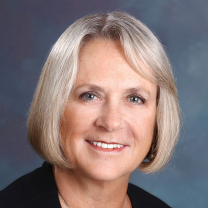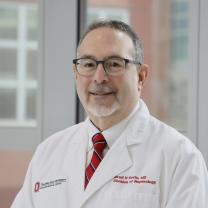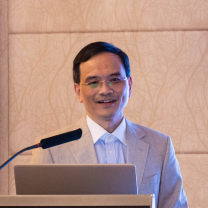Steering Committee

Professor Ed Vital
Professor in Autoimmune Connective Tissue Diseases and Honorary Consultant Rheumatologist
University of Leeds, United Kingdom
Ed Vital is a Professor in Autoimmune Connective Tissue Diseases and Honorary Consultant Rheumatologist, at Leeds Teaching Hospitals NHS Trust in the UK. He is also the Head of Lupus Research Group with interests in early disease, skin disease, musculoskeletal outcome measures, translational immunology, and B cell therapies. He is also a Member of the SLEuro Executive Committee, Chair of the British Society for Rheumatology Special Interest Group for SLE, and Chair of the British Isles Lupus Activity Group. In 2019, he won the Michael Mason Prize (British Society of Rheumatology) and in 2018, the Medical Research Foundation Emerging Leaders Award.
Ed studied Medicine and Surgery at the University of Manchester and became a Member of the Royal College of Physicians in 2004. In 2012, he completed his PhD, at the University of Leeds, where he became an Associate Professor.
His research interest is focusing on skin and musculoskeletal manifestations of lupus. He is interested in improving the understanding and treatment of these subsets of disease, by exploiting our institute’s established strengths in musculoskeletal imaging and rheumato-dermatology. His research themes include identifying people at risk of SLE for early diagnosis and treatment, stratified medicine and biomarkers, outcome measures, lupus arthritis, cutaneous lupus, B cell therapies and type I Interferons in autoimmunity.

Professor Richard Furie
Chief of Division of Rheumatology
Department of Medicine at Northwell Health, New York
Richard Furie is Chief of the Division of Rheumatology at the Department of Medicine, Northwell Health, New York, and Professor of Medicine at the Zucker School of Medicine at Hofstra/Northwell where he is also working within the Department of Molecular Medicine. He is Director of the SLE and Autoimmune Disease Treatment Centre, and of Northwell Health System’s clinical research program in musculoskeletal disease, The Program in Novel Therapeutics. He has served on many committees of the American College of Rheumatology, including the Board of Directors.
Professor Furie trained at Cornell University Medical College. He completed his internship and residency at The New York Hospital, after which he became a Fellow in Rheumatic Diseases at the Hospital for Special Surgery. He was then certified by the American Boards of Internal Medicine and Rheumatology.
His research interests include systemic lupus erythematosus and related diseases, and he has been the primary investigator on approximately 100 trials. He presently sits as Co-Chair of the Clinical Trial Design Subcommittee of the Lupus Clinical Investigators Network as well as Co-Chair of the Lupus Industry Council of the Lupus Research Alliance. He has received several awards and honours throughout his career, including an award for Top Doctors: NY Metro Area (1997 and 1999) and the Department of Medicine Research Award (2020). He was also named Arthritis Foundation Walk Honoree in 2014.

Professor Laurent Arnaud
Professor of Medicine
Strasbourg University School of Medicine, France
Laurent Arnaud is a Professor of Medicine at Strasbourg University School of Medicine, Strasbourg, France. At the University Hospital, he is a Senior Consultant in the Department of Rheumatology and his teaching duties include that of clinical examination and rheumatology to both MD and PhD candidates at undergraduate, graduate, and postgraduate levels.
Following a MD degree from Assistance Publique - Hôpitaux de Paris and Université Pierre et Marie Curie (Paris, France) and a PhD in immunology at the same institution, Professor Arnaud completed a fellowship programme with a specialisation in auto-immune diseases, mainly Systemic Lupus Erythematosus, at Hôpital Pitié-Salpêtrière in Paris. He then pursued post-doctoral clinical research on systemic lupus in Stockholm, Sweden and was subsequently appointed full Professor of Medicine at Strasbourg University School of Medicine, Strasbourg, France.
Professor Arnaud is an active member of the French National Reference Center for Rare Autoimmune Diseases of Strasbourg, of the European Reference Networks for rare diseases ReCONNET & RITA and has been appointed President-Elect of the European Lupus Society (SLEuro). He is the curator of a twitter account (@Lupusreference) about raising lupus awareness, followed by more than 4800 people.
His main research interests focus on the development and systematic evaluation of biological and immunomodulatory treatments for systemic diseases, with particular interest in the pathogenesis, diagnosis, and treatment of lupus erythematosus and the antiphospholipid syndrome. With his team, he has contributed to more than 150 research projects in the field of rare diseases.

Professor Chris Edwards
Consultant Rheumatologist and Honorary Chair of Clinical Rheumatology
University Hospital Southampton, UK
Professor Christopher Edwards is a Consultant Rheumatologist at the University Hospital Southampton NHS Foundation Trust and Honorary Chair of Clinical Rheumatology within the University of Southampton. He is also Associate Director of the NIHR Southampton Clinical Research Facility within the University Hospital Southampton NHS Foundation Trust and spent a year at the Tan Tok Seng Hospital in Singapore, gaining clinical experience in the management of severe lupus.
He attended medical school at King’s College London and trained at the Hammersmith and St George’s Hospital in London. He was a registrar for Professor Graham Hughes at the St Thomas’ Hospital Lupus Unit. He then undertook a period of research as a lecturer at the Kennedy Institute of Rheumatology at Imperial College, under the supervision of Professor Ravinder Maini.
His research interests are around lupus, rheumatoid arthritis, connective tissue disorders, Sjogren’s syndrome, vasculitis, and AS and PsA. He has been an investigator on a number of clinical trials of therapies for inflammatory rheumatic diseases. He is Clinical Director of the Southampton Musculoskeletal Research Unit, a recognised EULAR centre of excellence and is the past Chair of the EULAR Education Committee. The Southampton Lupus Clinic has been recognised as a Lupus UK Centre of Excellence and Professor Edwards has been a member of BILAG for almost twenty years.

Professor Cynthia Aranow
Director of the Clinical Autoimmunity Centre of Excellence
Feinstein Institute for Medical Research, New York
Cynthia Aranow is a Professor of Medicine and Director of the Clinical Autoimmunity Centre of Excellence at the Feinstein Institutes for Medical Research in New York. She also serves on the executive board of the Systemic Lupus International Cooperating Clinics (SLICC) and has contributed to their multicentre international studies looking at clinical outcomes in lupus. In addition, Dr Aranow is a member of the national Medical Scientific Advisory Council of the Lupus Foundation of American (LFA), serves on the Steering Committee of the Lupus Research Alliance’s (LRA) Lupus Clinical Investigator’s Network (LuCIN), as well as the Steering Committees of the international effort to define remission in SLE, DORIS.
Professor Aranow received her medical degree from the NYU School of Medicine, and completed her internship, residency and rheumatologic training at Montefiore Hospital and Albert Einstein College of Medicine, Bronx, New York.
Her research interests focus on lupus outcomes, as well as studies investigating the pathogenesis of lupus and of neuropsychiatric lupus. She co-directs the Clinical Research Unit at the Feinstein Institutes for Medical Research and has extensive experience in running and designing clinical trials. She has published over 100 publications and chapters focused on the different aspects of lupus and received the Edmund Dubois Memorial Award in recognition of excellence and accomplishment in the study of SLE.

Professor Eric Morand
Professor of Medicine and Head of the School of Clinical Sciences at Monash University, and Head of Rheumatology
Monash Health, Monash University, Melbourne, Australia
Eric Morand is Professor and Dean of the Sub-Faculty of Clinical and Molecular Medicine at Monash University, and Head of Rheumatology at Monash Health, in Melbourne Australia. He founded the Lupus Clinic at Monash Health, now Australia’s largest lupus cohort and biobank, which lead to the formation of the Australian Lupus Registry and Biobank, a national multicentre registry. He is a Member and former Board Member of the Australian Rheumatology Association, and an International Fellow of the American College of Rheumatology. He founded and chairs the Asia Pacific Lupus Collaboration, now among the largest longitudinal cohorts of SLE patients ever assembled, with over 4,000 patients under longitudinal follow-up.
He trained in rheumatology in Australia and at the Royal National Hospital for Rheumatic Diseases, UK, before completing his PhD at Monash University, where he has led rheumatology research since. He was Principal Investigator of the TULIP-2 phase 3 trial of anifrolumab, the second ever targeted therapy with a positive phase 3 trial in lupus, approved in multiple regions in 2021.
His laboratory research programme focuses on the effects of glucocorticoid-induced proteins in the immune system, with the overarching goal of finding pathways to deliver glucocorticoid-mimicking therapeutic effects without adverse effects. This led to the description of the expression and function of four novel proteins in rheumatic disease tissues and models. He was awarded the William E Paul Distinguished Innovator Award of the Lupus Research Alliance, New York, in 2015, and Evelyn V Hess Award of the Lupus Foundation of America and the Victoria Prize for Medical Research in 2022. He is on the editorial advisory boards of Nature Reviews Rheumatology, The Lancet Rheumatology, and Lupus Science and Medicine.

Professor Vibeke Strand
Adjunct Clinical Professor, Division of Immunology and Rheumatology
Stanford University School of Medicine, Palo Alto, California
Professor Vibeke Strand is an Adjunct Clinical Professor in the Division of Immunology/Rheumatology at Stanford University School of Medicine in Palo Alto. She joined Stanford in 1993, having previously taught at the University of California San Francisco (UCSF) School of Medicine (1981–1993). She has more than 40 years’ experience in clinical immunology, including positions as clinical investigator and subspecialist in private practice and clinical research positions in biotechnology firms. Since 1991 she has led a consulting practice offering clinical research and regulatory strategy expertise in rheumatologic diseases to pharmaceutical and biotech companies. She has participated in the development of most of the approved biologic and targeted synthetic agents in RA, PsA and SpA, including biosimilars, as well as promising and approved agents in SLE, OA, gout, FM and HIV.
Professor Strand completed her medical degree at UCSF, after which she completed a primary care internal medical residency at Michigan State University and rheumatology fellowship at UCSF. Her expertise includes defining regulatory strategies and efficient clinical development programs for novel therapies for autoimmune diseases. She helps design, review and evaluate protocols and clinical development programmes, and facilitates interactions with the US Food and Drug Administration.
Since 1992 she has served as a founding member of the Executive Committee of Outcomes in Rheumatology [OMERACT] consensus conferences. Throughout her career, she has also been a member of several prominent medical committees, including the Scientific Advisory Board of the Consortium of Rheumatology Researchers of North America (CORRONA, now CorEvitas) and the Board of Directors and Medical and Scientific Committee of the Northern California chapter, Arthritis Foundation. She also serves on the Editorial Board for the Journal of Rheumatology and Rheumatology (Oxford). Dr. Strand has authored and co-authored over 500 publications, is a Fellow of the American College of Physicians (1982) and Master of the American College of Rheumatology (2015).

Professor Victoria Werth
Professor of Dermatology and Medicine, University of Pennsylvania and Chief of the Division of Dermatology
University of Pennsylvania and Philadelphia Veterans Administration Hospital, Pennsylvania, USA
Victoria Werth is Chief of the Division of Dermatology at the Philadelphia Veterans Administration Hospital, Pennsylvania, USA.
Dr Werth earned her medical degree from Johns Hopkins University School of Medicine in Baltimore, Maryland. She completed a Residency in Internal Medicine at Northwestern Memorial Hospital in Chicago, Illinois, and a Dermatology Residency and Immunodermatology Fellowship at New York University School of Medicine. She joined the faculty at the University of Pennsylvania in 1989 and has developed an internationally recognised program in autoimmune skin diseases.
She is a co-founder of the Rheumatologic Dermatology Society and Past President of the group. She is co-founder of the Medical Dermatology Society, and a recipient of their lifetime achievement award. She initiated the combined internal medicine/dermatology residency program in the USA, which has successfully trained prominent leaders in complex medical dermatology.
She has a longstanding interest in clinical and translational research pertaining to cutaneous lupus erythematosus, with a focus on improving the treatment and outcomes. She has developed and validated disease severity tools now used in many international trials in lupus erythematosus, with a goal to advancing evidence for current and new therapeutics targeting these diseases. Her laboratory studies include studies of the mechanisms of cutaneous lupus, biomarker studies in cutaneous lupus examining the heterogeneity of the disease that relate to pathogenesis, and ultraviolet light effects on skin. Her work has been funded by the Dermatology Foundation, NIH, the VA, the Department of Defense, numerous autoimmune disease foundations, and industry.

Professor Maria Dall’Era
Professor of Medicine and Chief of the Division of Rheumatology
University of California, San Francisco, USA
Maria Dall’Era is the Jean S. Engleman Distinguished Professor of Medicine and Chief of the Division of Rheumatology at the University of California, San Francisco, USA. She is Director of the UCSF Rheumatology Clinical Research Center and Lupus Center. She also serves as the Chair of the Lupus Clinical Investigators Network (LuCIN) and is a steering committee member of the Lupus Academy and the Lupus 21st Century annual conference. She is the PI of a CDC-funded population- based longitudinal lupus cohort in the San Francisco Bay Area called the California Lupus Epidemiology Study and the PI on clinical trials focused on SLE and lupus nephritis.
She completed her Medical Degree in 1997, from the University of California, San Francisco, where she later completed her Internship and Residency, and became Chief Resident and the Fellow. In 2000, she became Board Certified in Internal Medicine and in 2004, became Board Certified in Rheumatology.
Professor Dall’Era has authored numerous publications in the areas of SLE and lupus nephritis. She is a co-author of the Treatment of Lupus Nephritis chapter in Up-To-Date. She received the Edmund L. Dubois Memorial Lectureship Award from the American College of Rheumatology and the Evelyn V. Hess award from the Lupus Foundation of America.
Her research interests include systemic lupus erythematosus, lupus nephritis, novel biologic agents, lupus nephritis outcomes, and clinical trials.

Professor Liz Lightstone
Professor of Renal Medicine for the Faculty of Medicine and Honorary Consultant Physician
Imperial College London & Imperial College Healthcare NHS Trust Renal and Transplant Centre, Hammersmith, UK
Liz Lightstone is a leading academic nephrologist practising in London, UK. She specialises in lupus nephritis, pre-pregnancy and pregnancy guidance in women with kidney disease, as well as glomerular and chronic kidney disease in general. Professor Lightstone has been involved in a number of research projects and clinical trials to attempt to find better solutions to the management of conditions in her field and has written many peer-reviewed articles in medical journals.
She has pioneered steroid sparing approaches in treating lupus nephritis and also established one of the largest obstetric renal clinics in the UK as well as a dedicated pre-pregnancy counselling service for women with kidney disease. Alongside her clinical practice, Professor Lightstone holds senior posts within Imperial College London and serves on the executive councils / steering groups of major renal charities and organisations including Kidney Research UK, the International Society of Nephrology, Women in Nephrology and SONG-GD.

Professor Brad H. Rovin
Lee A. Hebert Professor of Nephrology and Medical Director
Ohio State University Clinical Research Management Institute, Columbus, Ohio
Professor Brad H. Rovin is the Lee A. Hebert Professor of Nephrology and the Medical Director of the Ohio State University Center for Clinical Research Management. He received his Bachelor of Science in Chemical Engineering from Northwestern University in Evanston, Illinois, and his Doctor of Medicine from the University of Illinois Medical School in Chicago. After completing a residency in Internal Medicine at Barnes Hospital in St. Louis, and a Fellowship in Nephrology at Washington University School of Medicine, he joined the Ohio State University College of Medicine Faculty in 1990. He became Director of the Division of Nephrology in 2004 and served as Vice Chairman of Medicine for Research from 2009–2019.
Professor Rovin has had several leadership roles in the American Society of Nephrology, including running the Glomerular Diseases Pre-Course, and co-editing the Society’s NephSAP-Glomerular Diseases continuing education program. Most recently he was appointed Deputy Editor of Kidney International, the flagship journal of the International Society of Nephrology. He also is Co-Chair for glomerular disease guideline development for the Kidney Disease Improving Global Outcomes effort.
Professor Rovin studies the immunopathogenesis of glomerular and autoimmune diseases. He is heavily involved in clinical trial development and design for investigator-initiated and industry-sponsored trials. He is a founding member of NephroNet, a grass-roots nephrology community clinical trial organisation, and the Lupus Nephritis Clinical Trials Network. He is, and has been, the Principal Investigator on several trials of novel therapeutics for glomerular diseases.

Professor Chi-Chiu Mok
Chief of the Division of Rheumatology
Tuen Mun Hospital, Hong Kong
Professor Mok is the Chief of the Division of Rheumatology, Department of Medicine, Tuen Mun Hospital, Hong Kong. He is a consultant physician and an honorary teaching Professor of both the University of Hong Kong and the Chinese University of Hong Kong. Professor Mok has served as the Program Director of the Rheumatology/Immunology accreditation board of the Hong Kong College of Physicians.
Professor Mok is the Senior Associate Editor of the International Journal of Rheumatic Diseases, Therapeutic Advances of Musculoskeletal Diseases, Frontiers in Immunology, and an editorial member of the Journal of Rheumatology, Lupus and Current Rheumatology Review. He is a Past President of the Hong Kong Society of Rheumatology and is the founding Editor of the Journal of Clinical Rheumatology and Immunology, the official publication of the Hong Kong Society of Rheumatology.
Professor Mok is the first author of more than 200 papers in medical and rheumatology journals including Lancet Rheumatology, Annals of the Rheumatic Diseases, Nature Review Rheumatology and Arthritis & Rheumatology. His research interests include systemic lupus erythematosus and glucocorticoid-induced osteoporosis. Professor Mok is the chief author of a number of consensus recommendations for the treatment of systemic lupus erythematosus, including the APLAR consensus recommendations for the treatment of SLE and the Asia Pacific Lupus Nephritis Network recommendations for the treatment of lupus nephritis.

Doctor Guillermo J. Pons-Estel
Director of the Research Unit of the Argentine Society of Rheumatology (UNISAR) and Consultant
Centro Regional de Enfermedades Autoinmunes y Reumáticas (CREAR), Grupo Oroño, Rosario, Argentina
Dr Guillermo J. Pons-Estel is a leading specialist in autoimmune diseases, with a particular emphasis on systemic lupus erythematosus and antiphospholipid syndrome. He is currently serving as a consultant at the Centro Regional de Enfermedades Autoinmunes y Reumáticas (CREAR), Grupo Oroño, Rosario. He also holds the position of Director at the Research Unit of the Argentine Society of Rheumatology (UNISAR). Additionally, he contributes to the scientific committees of the Argentine Society of Rheumatology (SAR) and the Pan-American League of Rheumatology Associations (PANLAR).
He has published more than 120 original papers, brief notes, and reviews in peer-reviewed journals, along with over 150 presentations at national and international conferences. He has authored 15 book chapters, including contributions to Farreras Rozman on Internal Medicine and Systemic Lupus Erythematosus: Basic, Applied and Clinical Aspects. Additionally, he serves as a reviewer for several prestigious international journals, including Annals of the Rheumatic Diseases and Arthritis Care and Research.
In the field of clinical trials, he has worked as a sub-investigator in several randomised controlled trials involving biologics and small molecules for the treatment of rheumatoid arthritis and lupus. He is currently involved in the steering committee of multiple Phase II and III clinical trials for lupus treatments.















